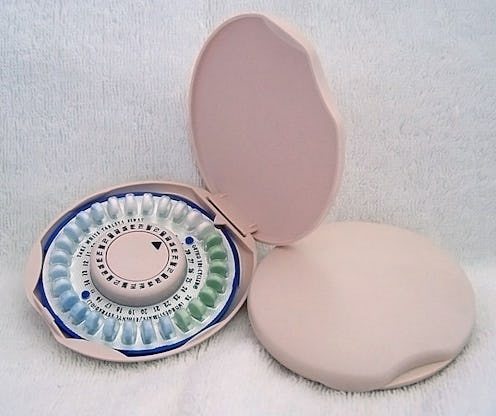Life
How To Safely Skip Your Placebo Birth Control Pills
If you're on the Pill for birth control, whether you take a combined version (which contains synthetic estrogen and progestogen) or the progestogen-only pill, you will likely have a set of 'placebo pills' at the end of the month's packet. After 21 or so days of active pills, the remaining seven or so have inactive ingredients, or are just sugar pills, and when you take them they usually induce withdrawal bleeding, which is not the same as a period. To prevent that bleeding, many women contemplate skipping the placebo pills altogether and simply going onto the next phase of the cycle — but they often worry about the health effects and whether it's safe.
First things first: the placebo pills aren't integral to the contraceptive process of the pill. That is, they're not necessary to make sure you're protected from pregnancy. Placebo pills were invented to give women the "feel" of a 28-day natural cycle, under the logic that they'd be more likely to remember to take a pill every day, and that withdrawal bleeds were comforting, since it's confirmation that you're not pregnant. (It was also an attempt to make the Catholic Church more amenable to the idea, but it didn't work.) While withdrawal bleeds aren't exactly the same as periods, they do tend to signal that you're not pregnant, as pregnancy tends to shift the body's hormones so that withdrawal bleeds n't take place, even if the pill's hormonal levels are still in your body.
However, the withdrawal bleed isn't technically necessary. Uterine tissue doesn't "build up" or anything like that when you're on the Pill; you don't really need the bleed, aside from getting the assurance that you're likely not pregnant. It's also been argued by medical experts that in the past, when birth control was non-existent or not used, women with large families were pregnant or giving birth very often in their lives, meaning they often had less than 50 periods in their entire lifetime without apparent ill-effects.
Skipping the placebo pill interval entirely can also have benefits, if your experience of the withdrawal bleeds is unpleasant and involves migraines, pain, or heavy bleeding. There are also more explicit gains. A study in 2014 found that, compared with people who took 28-day cycle pills, those who didn't take placebo pills "fared better in terms of headaches, genital irritation, tiredness, bloating, and menstrual pain." Sounds cool, right? The study also found that the uterine lining of the participants were normal after "cyclic or extended oral contraceptive use."
Some women arrange tricycling, which means having three sets of active pills in a row and then one withdrawal bleed. This reduces the amount of bleeds from 12 per year to four, and is particularly advised for women who suffer from endometriosis, the illness where uterine tissue grows and sheds outside of the uterus. The longer length of time between bleeds gives the body a chance to heal, as endometriosis withdrawal bleeds can be intense and painful. There are continuous-use pills on the market for this kind of usage, like Seasonale, with 12 weeks of active pills and then one week of placebo pills.
Data scientists for the period-tracking app Clue note that studies have shown that there appears to be no apparent negative health consequence to skipping periods regularly using contraceptive pills, but that long-term studies haven't been carried out. There's evidence to suggest that long-term users of hormonal birth control may have a higher risk of breast, liver, and cervical cancer, but it's unclear whether skipping placebo weeks has any effect on these outcomes. Some doctors advise tricyclic regimes over skipping periods altogether because we're not entirely sure about how things play out long-term, so it's a conversation you should have with your gynecologist or GP. One risk we do know about is that continual pill use can often lead to breakthrough bleeding, which is usually less intense than withdrawal bleeding or periods, but is also unpredictable.
Overall, the primary thing you should know is: it's safe, it's normal, and it's not that big of a deal. But you should always talk about it with the person prescribing your birth control, so that you can figure out the right regime for you (and potentially switch to another method, like an IUD, which can induce lighter or absent periods in women). Happy bleeding (or not bleeding), everybody.
This article was originally published on
